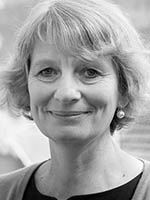Prof. Dr. Edith Franke

Areas of interest
- Religious transformations and plurality in contemporary societies
- Interaction of religious communities in secular, Christian shaped Germany and Islamic dominated Indonesia
Discourses on secularity and religiosity among young Muslim intellectuals in Indonesia
Modern Indonesia is in many ways an ideal research site for developing an understanding of the divergent views on, and the dynamics of the relationship between religiosity and secularity. Since the end of the authoritarian Suharto regime in the late 1990s, processes of decentralisation and democratisation, as well as the rise of normative Islam, have led to the intensification of debates on the limits of religious freedom, necessarily touching on how ideas such as religion, heresy, blasphemy and secularity should be understood. More or less public discourses that deal with the development of a new religious identity beyond traditional categories of religiosity and secularism can be observed among young intellectuals. These controversial debates draw at the same time on local religious traditions beyond the official religions (agama) on the one hand, and reference global debates on democracy and secularism on the other; they are accompanied by scholarly discourses that reflect on the relationship between secularism and religion in religious policy and in the Indonesian constitution.
Against that background, this project – based on group discussions and interviews with young Indonesian intellectuals – explores an understanding of religion and secularity between Islamic culture, local tradition and modernity. A special focus of the investigation will be on the degree to which divergences between the normative requirements of a fundamentally religious stance and individual identification can be discerned. It is assumed that individual models and concepts of religion and secularity, and how to understand and deal with them, can be identified and will reveal new perspectives on the relationship between religion and non-religion and the space between them.
For younger intellectuals, references to popular media culture and global discourse on modernity and secularity also play a major role in their perspective on religion. The analysis of the religious localisation of young intellectuals in the Islamic culture in Indonesia will reveal discrepancies between normative categorisations and individual negotiation processes, as well as offer in-depth insights into the contemporary plausibility and scope of terms such as “secularism” and “religiosity”. The goal is to redefine the terms “religiosity” and “secularity” in the Indonesian context not as opposites but as models that need to be described in relation to one another in a dynamic field.
Biography
Director, Center for Interdisciplinary Study of Religions, Philipps-University Marburg (Germany)
Professor for Comparative Study of Religions, Philipps-University Marburg
Director, Religionskundliche Sammlung (Museum of Religions), Philipps-University Marburg, Marburg (Germany)
Deputy Professor for Empirical Study of Religion and Theory of Religion, University of Bremen (Germany)
Habilitation
Assistant Professor, University of Hanover (Germany)
PhD (Dr. phil.), Study of Religions, University of Hanover
Research Assistant, Department for the Study of Religions, University of Hanover
Lectureships at the University of Bremen, University of Hanover and University of Lucerne
Relevant Publications
- Franke, Edith (2014). Religiöse Minderheiten und Gesellschaftlicher Wandel. Wiesbaden: Harrassowitz.
- Franke, Edith, and Sebastian Murken (2014). „Lia Eden und Gabriele Wittek. Zeitgenössische Prophetinnen zwischen religiöser Tradition und Non-Konformität,“ in Devianz und Dynamik. Festschrift für Hubert Seiwert zum 65. Geburtstag. Edited by Edith Franke, Christoph Kleine and Heinz Mürmel, 80–96. Göttingen: Vandenhoeck & Ruprecht.
- Franke, Edith, and Leyla Jagiella (2014). „Was macht die Akzeptanz einer religiösen Minderheit aus? Probleme und Grenzen religiöser Pluralität im islamisch geprägten Indonesien,“ in Religiöse Minderheiten und Gesellschaftlicher Wandel. Edited by Edith Franke, 36–54. Wiesbaden: Harrassowitz.
- Franke, Edith (2014). Religionswissenschaft zwischen Sozialwissenschaften, Geschichtswissenschaft und Kognitionsforschung. Marburg.
- Franke, Edith, and Katja Triplett (2013). „Konvergenzen und Divergenzen religiöser und politischer Systeme im gegenwärtigen Asien.“ Religiöse Gegenwart Asiens / Studies in Modern Asian Religions, 7 (2013): 5–11.
- Franke, Edith (2013). “Searching for Traces of Judaism in Indonesia,” in Between Mumbai and Manila. Judaism in Asia since the Founding of the State of Israel. Edited by Manfred Hutter, 39–51. Bonn: University Press.
- Franke, Edith (2013). „Islam in Indonesien: Vielfältig, widersprüchlich, zukunftsweisend?,“ in Von Derwisch-Mütze bis Mekka-Cola. Zur Vielfalt islamischer Glaubenspraxis. Edited by Edith Franke and Konstanze Runge, 149–64. Marburg: diagonal-Verlag.
- Franke, Edith (2012). Einheit in der Vielfalt. Strukturen, Bedingungen und Alltag religiöser Pluralität in Indonesien. Wiesbaden: Harrassowitz.
- Franke, Edith, and Michael Pye, eds (2006). Religionen Nebeneinander. Modelle religiöser Vielfalt in Ost- und Südostasien. Münster: Lit.
- Pye, Micheal, Edith Franke, Alef Theria Wasim, and Abdurrahman Mas'ud, eds (2012). Religious Harmony: Problems, Practice and Education. Proceedings of the Regional Conference of the Association for the History of Religions. Yogyakarta and Semarang, Indonesia. Berlin, New York: de Gruyter.


